Female Forest Guardians #ChooseToChallenge Gender Inequality While Saving Red Pandas
Red Panda Network is committed to recruiting more female Forest Guardians and providing educational scholarships for female students.
On International Women’s Day 2021, join us in Empowering Women During Covid-19! Our field staff had the pleasure of interviewing a few of our female Forest Guardians and we are pleased to share their courageous stories and experiences with you today.
The soothing sounds of mountain streams and birds chirping gently nudge Man Kumari Nembang awake on a cold, frosty morning. After she completes her morning household chores, she grabs her field monitoring gear, joins her fellow Forest Guardian counterparts, and sets out to patrol the forest habitat; navigating steep unforgiving terrain — in search of wild red pandas.
Man Kumari’s patrol requires her to note vegetation status, assess deforestation threats, scout for illegal poaching activities: footprints, traps, and snares; report her findings to enforcement agencies, and engage local communities to educate them about forest conservation. This is all in a day’s work for Man Kumari, the 45-year-old, single mother of three children, and one of the four female forest guardians recruited by the Red Panda Network (RPN).
Forest Guardians are critical to protecting red pandas and their natural habitat, and are at the forefront of RPN’s conservation efforts. Today, there are over hundred RPN Forest Guardians working in the Himalayas of Nepal. Although Forest Guardians are predominantly male, groundbreakers like Man Kumari are setting examples for other women who want to work in the field.
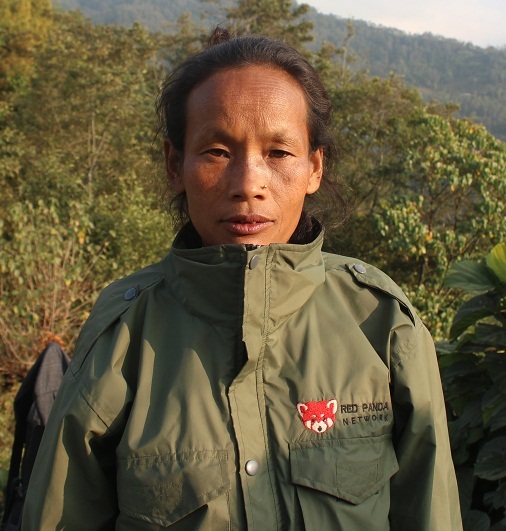
RPN Forest Guardian, Man Kumari Nembang.
"A woman can excel in anything that she desires. She can do as much as a man does, and sometimes even do better. We’re here because of a passion and love we share for red pandas and we’re prepared to take action and urge others to do the same,” shared Bimala Moktan, another female Forest Guardian, and a “Green Soldier” as she likes to call herself.
These women are challenging and breaking existing cultural norms and finding new opportunities in male-dominated professions. International Women’s Day allows us to celebrate and share the fortitude and courage of these unsung conservation heroes. We hope it will encourage conversation and open doors for young aspiring girls who believe there are greater opportunities available to themselves.
RPN: What motivated you to become a Forest Guardian?
Man Kumari Nembang: A few years ago, illegal poaching and forest resource harvesting was at its peak in my village. At home, I had a 19-month baby, as well as two other children, and was concerned about their future on two fronts: the degrading village forest, and my family’s challenging financial situation. Becoming a Forest Guardian let me protect the forest and endangered red pandas, and at the same time, secure financial support for my family. I joined RPN four years ago and have never looked back.

RPN Forest Guardian, Bimala Moktan.
Bimala Moktan: I always had a deep passion, empathy, and fascination for nature and the environment which continues to bloom today. Growing up, I witnessed strong gender inequality - my father, uncle, brother, and all the men would do outdoor work and my mother, sister, and I were confined to household chores. I wanted to change that thinking and encourage positive and sustained gender representation. Through the RPN Forest Guardian program, I can enhance my skills, knowledge, and understanding and use it to protect red pandas and their habitat, and also amplify and empower female community voices. Being a Forest Guardian has enabled me to live up to the vision and the values I treasured.
Dipa Rai: As cliche as it may sound, being the guardian of our forest and wildlife is thrilling and indulging. I remember one day, we were conducting forest habitat monitoring, and a wild boar appeared in front of us out of nowhere. I was terrified and just ran with all my courage. It still gives me goosebumps! The forest acts as an antidote to stress and apprehension. We rely on the forest for everything from the food we eat, to the air we breathe, to the wood we use. Realizing the central role of forest, its species, and ecosystem in sustaining livelihood made me adore it even more. However, witnessing escalating illegal wildlife poaching and degrading forest habitat over time made me worried. Many youths are leaving the village for foreign employment, so the onus of protecting red pandas and their habitats lies on people like us.
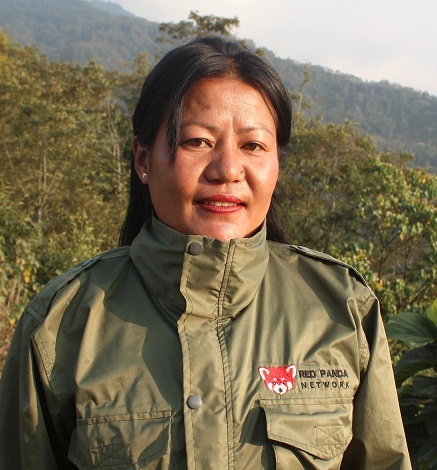
RPN Forest Guardian, Dipa Rai.
RPN: What are some of the particular challenges you have faced as a woman who wants to work in conservation?
Man Kumari Nembang: The challenges with patrolling red panda and forest habitat in the deep bamboo forest with deceptively slippery terrain, worsened by harsh unpredictable weather are pretty obvious, but my strong zeal and passion for red panda conservation drives me to keep moving. Initially, people doubted my intentions and even thought I was an illegal poacher, but the scenario is different now. Moreover, I am a single mother, so juggling household chores, taking care of kids, and monitoring the forest around the clock can sometimes be daunting and taxing, but I enjoy every bit of it.
Bimala Moktan: Initially convincing my family to let me step into the role of Forest Guardian and defy social norms was a challenge. Some people downplayed and doubted my ability, and also mocked and ridiculed me for joining male colleagues alone in the forest. However, matching my male counterparts while performing Forest Guardian duties has never been an issue for me. My physical appearance and strength has never been a barrier, as some people might mistakenly think. I firmly believe that the blend of both male and female skillset, experience, and diverse knowledge are critical to effective sustainable forest and red panda conservation. Over time, I've developed a resilient nature. The conservation work we do has made positive impacts on the community, and that has changed the way society perceives us. Now we're being heard and treated more equally. But despite progress, there is still more work to do.
Dipa Rai: Red panda monitoring in the dense bamboo forest is a physically demanding job. At first, I sometimes struggled with the pace of field monitoring. Moreover, accomplishing field monitoring tasks on time and navigating the way back home is often challenging, because of things like heavy fog, steep terrain and deceptive weather. The fear of wildlife attacks and unforeseen accidents is always there.
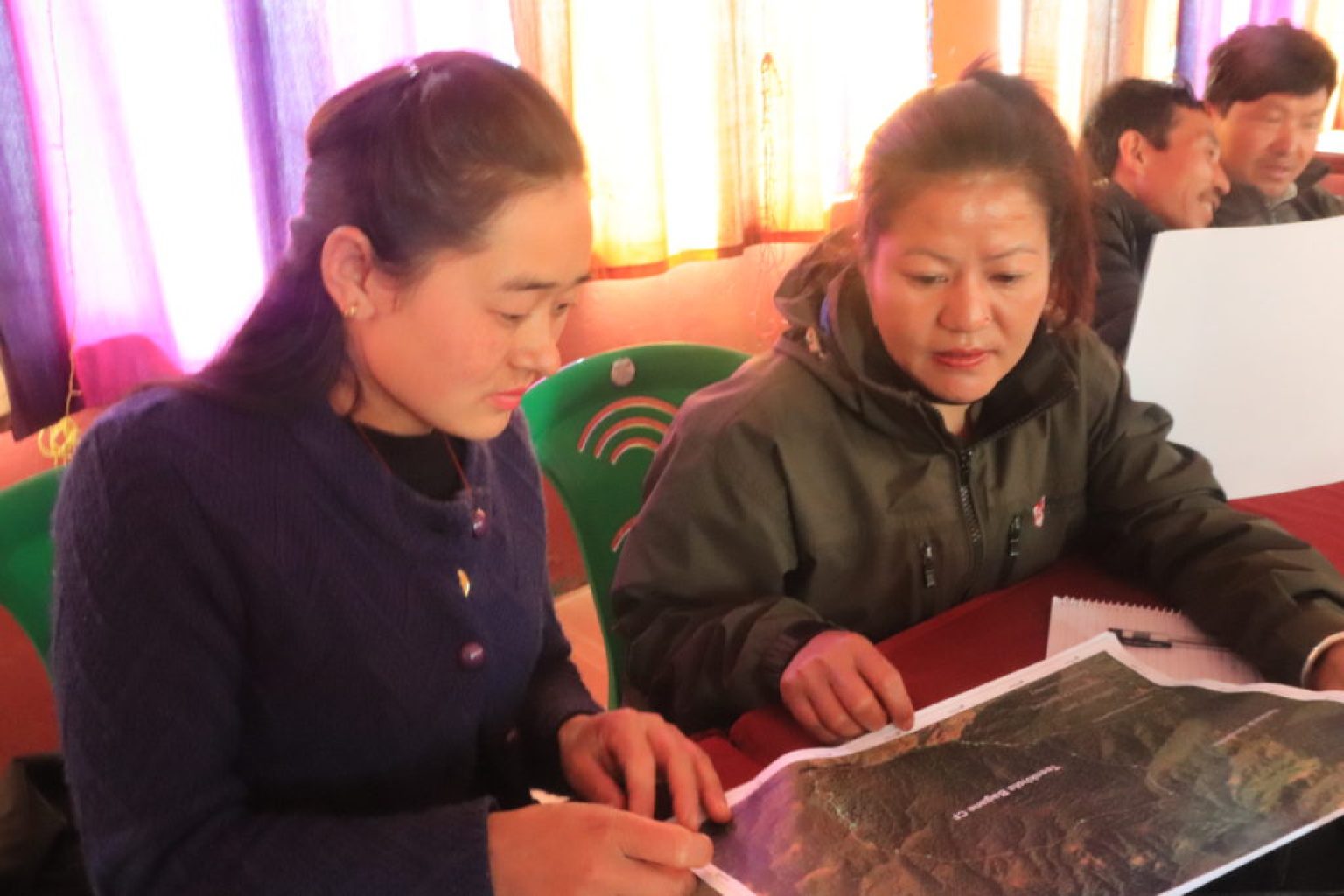
Bimala Moktan and Dipa Rai during 2020 FG training in Panchthar district.
RPN: How has your role as a Forest Guardian helped you fulfill your dreams/goals of working in conservation?
Man kumari Nembang: I live adjacent to red panda habitats, so frequent encounters with red pandas were normal and that developed my deep attachment with them. But over time, I saw fewer red pandas and signs of their presence, so I wanted to protect them and their habitat but was clueless on how to proceed. Luckily, through the Forest Guardian program, I got the chance to acquire scientific and practical knowledge about red pandas, and enhance my skills and techniques for monitoring forest habitats. Today I have the knowledge, skills, and formal authority to stop illegal poaching and forest harvesting, educate local communities, and help protect red pandas and their habitat. I wonder what more one could desire.
Bimala Moktan: Early in my life, I realized that the survival of mankind relies on a healthy environment, forest, and nature. While many of my peers were leaving to work in other places, I wanted to do something in my village, and safeguard the forest and wildlife from further degradation. As a Forest Guardian, my responsibilities revolve around monitoring red panda habitats, educating local communities on conservation, patrolling to stop poaching, checking for signs of forest fire, and restoring conservation ponds. This is the conservation work I’ve always dreamt of doing.
Dipa Rai: Escalating illegal forest harvesting and wildlife poaching in my village has always been my concern. I wanted to do something to combat illegal forest activities, but I was aware of the degree of danger and conflict I must contend with. Through my four years’ experience of working as Forest Guardian, I am now trained with anti-poaching patrolling skills and well-informed of the existing laws and regulation concerning illegal poaching. Most importantly, I have the authority to fight against illegal loggers and poachers.
RPN: How has the COVID-19 pandemic impacted your role as a forest guardian?
Man Kumari Nembang: Performing Forest Guardian duties while staving off infectious disease is challenging, especially with the limited access to preventive medical supplies including hand sanitizers, masks, and inadequate hygienic measures. In response to COVID-19, human movement in and from outside the village was restricted. As entry was constricted, sometimes forest monitoring equipment stopped functioning and it was difficult to get the new, replacement equipment from a nearby city. That potentially impacted our day-to-day forest monitoring activities. Moreover, with limited villagers’ movement allowed, it became more common for wildlife to venture into human settlements, so we rescued a lot of wild animals.
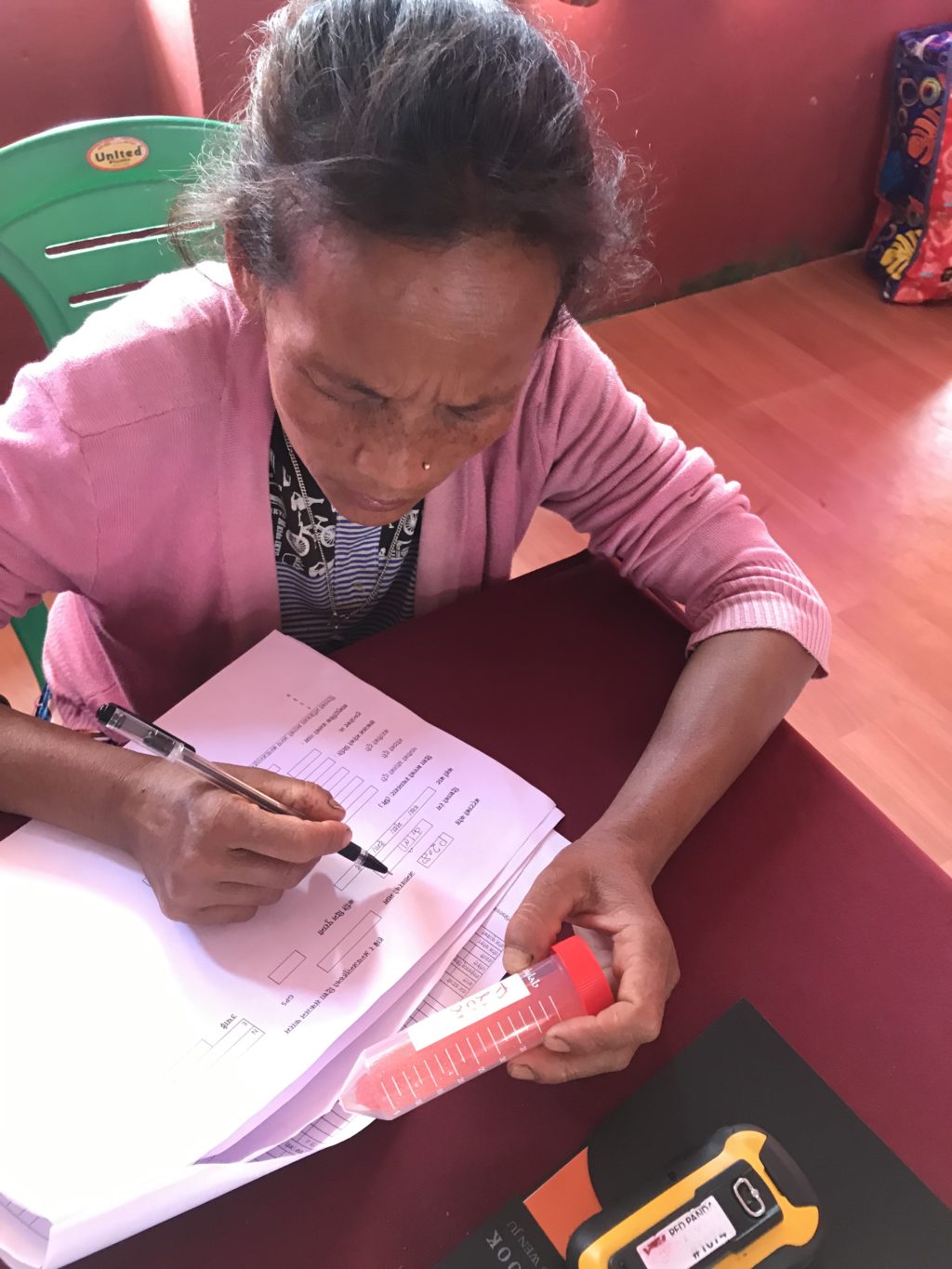
Man Kumari Nembang during 2020 FG training in Panchthar district.
Bimala Moktan: As I reside in a small village with limited population far from the city, there are comparatively less visible impacts of the COVID-19 crisis. We are undertaking our jobs during the pandemic by adopting COVID-19 safety precautions and maintaining social distancing. However, some of our red panda monitoring blocks lie on the edge of the Nepal/India border. Travel restrictions imposed on the border made it difficult for us to patrol, inspect, and oversee the looming encroachment crisis and potential illicit logging or poaching activities.
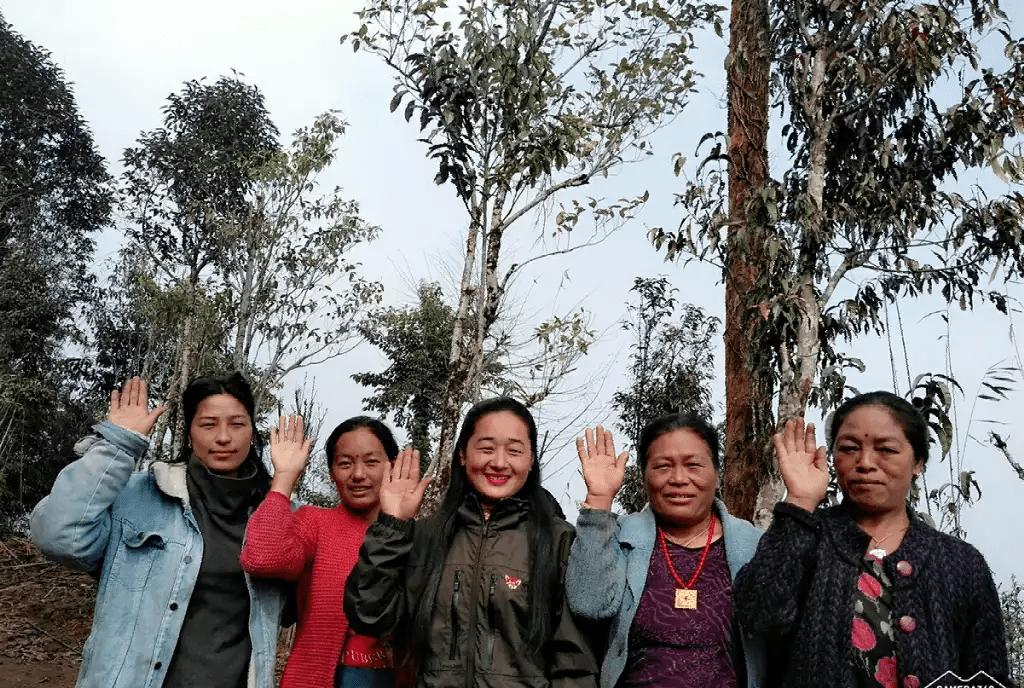
Forest Guardian, Bimala Moktan, and local women choose to challenge.
Dipa Rai: Reverse migration, loss of livelihood means, and confined human movement engendered by COVID-19 pandemic have enticed people to illegally poach wildlife and encroach forest habitat leaving red pandas in a more vulnerable state. The rise in illegal poaching demanded our intense presence and frequent patrolling. In response, we scaled down and halted conservation activities that require social gatherings, and emphasized forest wildlife patrolling and heightened vigilance.
RPN: Would you like to say something to those who aspire to become like you?
Man Kumari Nembang: Inspired by my efforts to protect the forest environment, my 16-year-old daughter aspires to become a Forest Guardian in the future and wishes to take my legacy forward. What could be more thrilling than that? Age and physical strength can never be a hurdle to the noble mission of protecting forests and wildlife. Passion and determination are what drives you.
Bimala Moktan: Protecting and maintaining healthy forest vitality is our shared moral responsibility. There will always be something that holds you back. Be brave enough to dream and engage in the offbeat unconventional job of being forest warriors.
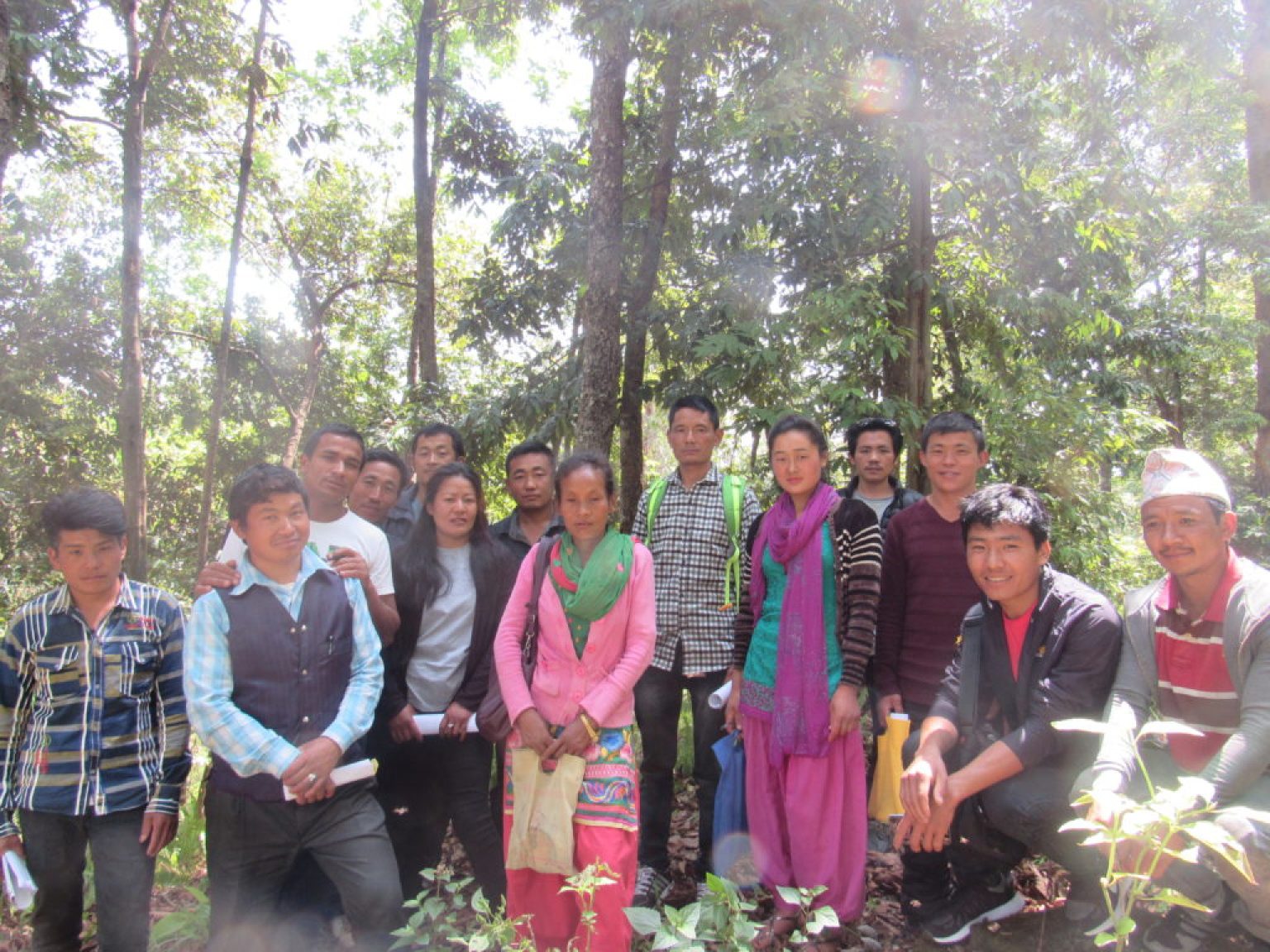
Dipa Rai, Man Kumari Nembang and Bimala Moktan during 2018 FG training in eastern Nepal.
Dipa Rai: With challenge comes change, never hesitate to take action in the cause that you truly believe.
Over the last few years, our Forest Guardians have created incredible change, restoring 66 hectares of red panda habitat, planting 400,000 trees in Community Forests, and working closely with local communities to help educate and create a greater sense of ownership. However, the impact from the Covid-19 pandemic has been significant, and women and girls in rural Nepal are disproportionately impacted by it.
Providing women with new, alternative employment opportunities can provide essential support, while also protecting red pandas. In celebration of International Women’s Day, our Empower Women During Covid-19 campaign will support our recruiting efforts to hire more women and offer educational scholarships for female students. Please help create gender equality in Nepal and save red pandas by donating to this campaign!
Pema Sherpa
Monitoring Officer
Red Panda Network
Brian Sim
Writing and Communications Volunteer
Red Panda Network

